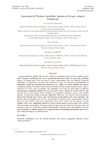Please use this identifier to cite or link to this item:
https://accedacris.ulpgc.es/jspui/handle/10553/106712
| Title: | Assessment of various anesthetic agents on Octopus vulgaris Paralarvae | Authors: | Escánez, Alejandro Rubio, Jesús Riera, Rodrigo Almansa, Eduardo |
UNESCO Clasification: | 240119 Zoología marina 251092 Acuicultura marina |
Keywords: | Anesthesia Cephalopods Clove oil Ethanol Induction and recovery, et al |
Issue Date: | 2018 | Journal: | Journal of the World Aquaculture Society | Abstract: | European Directive 2010/63 addresses the welfare of cephalopod species used in scientic projectsunder European jurisdiction and covers experimental procedures likely to cause pain, suffering,distress, or lasting harm. These procedures require authorization from the National CompetentAuthorities. In aquaculture research, some procedures require the temporary immobilization ofindividuals to allow for measuring body parameters (i.e., weight, sex, gonad condition, and others),avoiding any damage. This study compares three anesthetics used on common octopus, Octopus vulgaris,paralarvae to reach a state of sedation. The anesthetics were tested for their effects at differentconcentrations: magnesium chloride (6.8, 13.6, 20.4, and 27.4 g/L), ethanol (8, 10, and 12 mL/L), andclove oil (0.2, 0.3, and 0.4 g/L). Three variables were monitored: induction, recovery, and stressfulbehavior of paralarvae during treatments. Signicant differences were found between anesthetics,both in the induction and recovery time, and between concentrations of the same anesthetic. Theshortest times of induction and recovery corresponded to ethanol at low concentrations, 10 mL/L(20 ± 1 sec) and 8 mL/L (19 ± 2 sec), respectively. Clove oil at 0.2 g/L was the slowest to reachsedation (340 ± 7 sec). Magnesium chloride at 20.4 g/L showed longer recovery times (554 ± 201 sec)with increasing concentrations. Octopus paralarvae showed adverse behavior only under clove oiltreatments, whose use is therefore considered inadmissible. This study shows that ethanol at 10 mL/Lmay be suitable as a reliable anesthetic for octopus paralarvae, diminishing the induction and recoverytime without showing any stressful behavior. | URI: | https://accedacris.ulpgc.es/handle/10553/106712 | ISSN: | 0893-8849 | DOI: | 10.1111/jwas.12444 | Source: | Journal of the World Aquaculture Society [ISSN 0893-8849], v. 49 (6), p. 1019-1025 |
| Appears in Collections: | Artículos |
WEB OF SCIENCETM
Citations
10
checked on Feb 15, 2026
Page view(s)
68
checked on Jan 10, 2026
Google ScholarTM
Check
Altmetric
Share
Export metadata
Items in accedaCRIS are protected by copyright, with all rights reserved, unless otherwise indicated.
